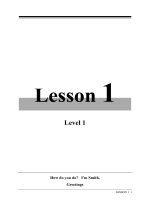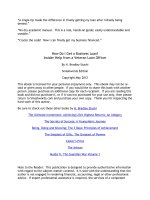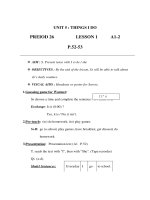LESSON 1: How do you do? I''''m Smith. Greetings potx
Bạn đang xem bản rút gọn của tài liệu. Xem và tải ngay bản đầy đủ của tài liệu tại đây (96.11 KB, 9 trang )
LESSON 1 1
Level 1
How do you do? I'm Smith.
Greetings
2 LESSON 1
Objectives
1. Hajimemashite.
How do you do?
2. Watashi wa Smith desu.
I'm Smith.
3. Watashi wa Amerika-jin desu.
I'm an American.
4. Tanaka : Susan-san wa gakusei desu ka?
Susan : Hai. Watashi wa gakusei desu.
Tanaka : Are you a student?
Susan : Yes, I'm a student.
5. Yamada : Susan-san wa Amerika-jin desu ka?
Tanaka : Iie, Susan-san wa Amerika-jin janai desu.
Susan-san wa Kanada-jin desu.
Yamada : Is Susan an American?
Tanaka : No, she is not an American.
She is a Canadian.
LESSON 1 3
Opening Dialogue
Susan : Hajimemashite. Susan desu. Doozo yoroshiku.
Tanaka : Hajimemashite. Tanaka desu. Doozo yoroshiku.
Susan-san wa gakusei desu ka?
Susan : Hai, soo desu.
Tanaka : Okuni wa dochira desu ka?
Susan : Kanada desu.
Tanaka : Soo desu ka.
Susan : How do you do? I'm Susan. Nice to meet you.
Tanaka : How do you do? I'm Tanaka. I'm glad to meet you.
Are you a student?
Susan : Yes, I am. (lit. That's right).
Tanaka : Where are you from? (lit. Where is your country?)
Susan : I'm from Canada. (lit. It's Canada.)
Tanaka : I see.
Tanaka : Konnichiwa.
Yamada : Konnichiwa. Atsui desu ne.
Tanaka : Ee, atsui desu ne.
Tanaka : Hello.
Yamada : Hello. It's hot, isn't it?
Tanaka : Yes, it is.
4 LESSON 1
Objectives
1.
How do you do?
2.
I'm Smith.
3.
I'm an American.
4.
Tanaka : Are you a student?
Susan : Yes, I'm a student.
5.
Yamada : Is Susan an American?
Tanaka : No, she is not an American.
She is a Canadian.
LESSON 1 5
Opening Dialogue
Susan : How do you do? I'm Susan. Nice to meet you.
Tanaka : How do you do? I'm Tanaka. I'm glad to meet you.
Are you a student?
Susan : Yes, I am. (lit. That's right).
Tanaka : Where are you from? (lit. Where is your country?)
Susan : I'm from Canada. (lit. It's Canada.)
Tanaka : I see.
Tanaka : Hello.
Yamada : Hello. It's hot, isn't it?
Tanaka : Yes, it is.
6 LESSON 1
[A] wa [B] desu
Noun A
wa
Noun B
desu
This means "Noun A is noun B". Wa is a particle and a topic marker. The noun followed by a
particle wa is the topic of a statement or a question. The topic often refers to the same thing as
the subject, but not necessarily.
Desu identifies a person or a thing. It can be translated into "is/are/am" in English. Desu is not
affected by gender or number. The negative form and the past tense of desu are as followings
respectively: Ja arimasen and ja arimasendeshita are more formal.
Affirmative Negative
Non-past tense
(Present / Future)
desu
janai desu
ja arimasen
Past tense
deshita
janakatta desu
ja arimasendeshita
1. Watashi wa Chris Norman desu.
I am Chris Norman.
2. Satoo-san wa sensei janai desu.
(Mr./Ms.) Satoo is not a teacher.
3. Kimura-san wa sensei deshita.
(Mr./Ms.) Kimura was a teacher.
Question marker ka?
Ka is a question marker. Ka added to the end of a sentence makes it into a question.
The word order does not change. Hai means "yes" and iie means "no".
Ee is also commonly used for "yes" in casual situation.
Satoo : Smith-san wa Amerika-jin desu ka?
Smith1 : Hai, watashi wa Amerika-jin desu.
Smith2 : Iie, watashi wa Amerika-jin janai desu.
Satoo : (Mr. Smith,) Are you an American?
Smith1 : Yes, I'm an American.
Smith2 : No, I'm not an American.
LESSON 1 7
-Honorific title -san
-san is a honorific title like "Mr., Mrs., Miss or Ms.". This can be added to either a surname or
a first name, of a male or a female. San shows respect to the person, so it should not be used
with one's own name and one's family.
How to say "You"
"You" is anata. In English, "you" is commonly used in any situation.
However, in Japanese, Anata is sometimes regarded as a sign of "disagreement", "criticism"
or "dissatisfaction". In Japanese conversation we usually call one's name instead of using
anata.
Norman : Anata wa tsuuyaku desu ka?
Norman : Yoshida-san
wa tsuuyaku desu ka?
Yoshida
: Hai, watashi wa tsuuyaku desu.
Norman : Are you an interpreter?
Yoshida : Yes, I am.
Omission of the subject
In Japanese, the subject is often omitted when it is clearly understood by the speakers from the
context of the sentence.
Yamada : Norman-san wa puroguramaa desu ka?
Norman : Hai, (watashi wa) puroguramaa desu.
Yamada : Are you a computer programmer?
Norman : Yes, I'm a computer programmer.
Hajimemashite "How do you do?"
Hajimemashite "How do you do" and Doozo yoroshiku "It's nice to meet you" are greeting
expressions. They are used when meeting someone for the first time.
"Name" is namae. "My name is Smith" is Watashi no namae wa Smith desu, however, this
expression is rarely used for greetings. When you introduce your name, you should say
Watashi wa Smith desu "I'm Smith".
Katoo : Hajimemashite. Katoo desu. Doozo yoroshiku.
Norman : Hajimemashite. ABC no Norman desu. Doozo yoroshiku.
Katoo : How do you do? I'm Katoo. It's nice to meet you.
Norman : How do you do? I'm Norman from ABC. I'm glad to meet you.
ABC no Norman means "Norman of/from ABC". No is a particle indicating an attribution or
belonging. When a noun modifies another noun, no comes between them.
See Lesson 2 for more about no.
8 LESSON 1
How are you?
English speaking people naturally want to know how to say "How are you?" because it is used
as a daily greeting in English.
An exact translation is O-genki desu ka? "Are you well?", however, the usage is quite
different from the English phrase "How are you?". O-genki desu ka? is used to inquire about
the health of someone you haven't seen in a long time. Therefore it is not used as a general
greeting like the English phrase "How are you?".
Japanese people usually say just Ohayoo gozaimasu "good morning", Konnichiwa "good
afternoon" or Konbanwa "good evening" to someone they often see.
1. Ohayoo gozaimasu
Good morning
2. Konnichiwa
Good afternoon
3. Konbanwa
Good evening
Atsui desu ne "It's hot, isn't it?"
Atsui means "hot" and desu ne is the tag question asking an agreement.
Phrases about weather such as atsui desu ne "It's hot, isn't it?" or samui desu ne "It's cold,
isn't it?" are common greeting phrases among friends and colleagues.
Atsui, samui and ii are adjectives. Adjectives are introduced in Lesson 8.
1. Atsui desu ne.
It's hot, isn't it?
2. Samui desu ne.
It's cold, isn't it?
3. Ii tenki desu ne.
It's a fine day, isn't it? (lit. Nice weather, isn't it?)
4. Ame desu ne.
It's raining, isn't it?
LESSON 1 9
Soo desu "Yes, it is" vs. Soo desu ka "I see"
Soo desu means "Yes, it is" or "That's right". Soo desu ka with the lower-ending is not a
question, but it means "I see".
Katoo : Susan-san wa gakusei desu ka?
Susan : Hai, soo desu.
Katoo : Okuni wa dochira desu ka?
Susan : Kanada desu.
Katoo : Soo desu ka.
Katoo : Are you a student?
Susan : Yes, I am.
Katoo : Where are you from? (lit. where is your country?)
Susan : I'm from Canada. (lit. It's Canada.)
Katoo : I see.
Okuni wa dochira desu ka? "Where are you from?"
You may be often asked about where you are from by a Japanese. The common phrase for this
question is Okuni wa dochira desu ka? which literally means "What is your country?".
Kuni means "country" and o-kuni is the respectful form. Dochira means "which", but this is
often used as "where" in formal speech.
One's nationality such as a Japanese or an American is made by adding -jin to a country name.
Countries Countries People (Nationalities) Langauges
Japan
Nihon Nihon-jin Nihongo
America
Amerika Amerika-jin Eigo
Canada
Kanada Kanada-jin
United Kingdom
Igirisu Igirisu-jin Eigo
France
Furansu Furansu-jin Furansugo
Germany
Doitsu Doitsu-jin Doitsugo
Spain
Supein Supein-jin Supeingo
Italy
Itaria Itaria-jin Itariago
Netherlands
Oranda Oranda-jin Orandago
Denmark
Denmaaku Denmaaku-jin Denmaakugo
China
Chuugoku Chuugoku-jin Chuugokugo
Korea
Kankoku Kankoku-jin Kankokugo
India
Indo Indo-jin
Australia
Oosutoraria Oosutoraria-jin Eigo
Brazil
Burajiru Burajiru-jin Porutogarugo
Mexico
Mekishiko Mekishiko-jin Supeingo









